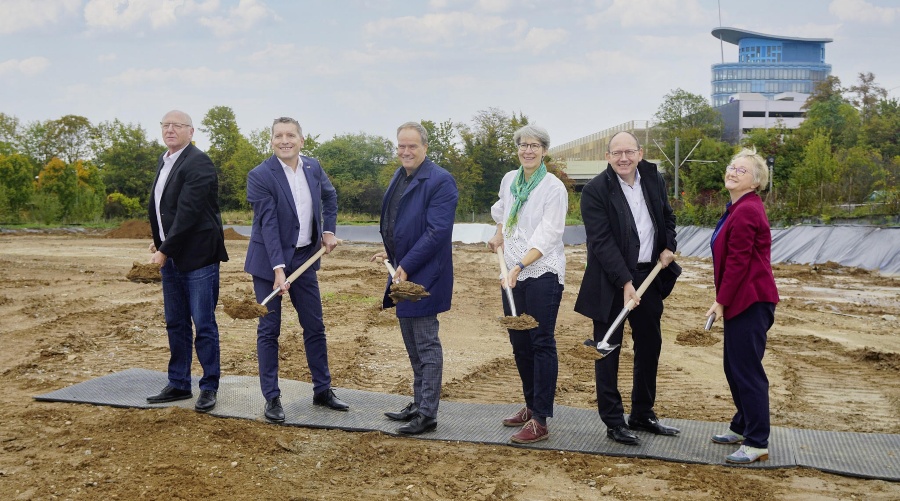
- Fixed order for 40 electric articulated buses from 2023, with another 35 as an option.
- Combination of high-performance batteries with a fuel cell maximizes their range.
- The equipment is equally comfortable, safe and user-friendly.
- Rhein-Neckar-Verkehr GmbH: one transport company, three cities.
Stuttgart/Mannheim/Heidelberg – Verkehrsbetriebe Rhein-Neckar-Verkehr GmbH (rnv), headquartered in Mannheim, is accelerating its transformation to electromobility. In the presence of Elke Zimmer, State Secretary at the Ministry of Transport for the State of Baden-Württemberg and Prof. Dr. Eckart Würzner, Mayor of Heidelberg and Christian Specht, Chairman of the Supervisory Board rnv, the first ground-breaking ceremony took place for the depot in Heidelberg with a hydrogen filling station that was also accessible to the public. At the same time, the company announced a major order for up to 75 fully electric Mercedes-Benz eCitaro G articulated buses with fuel cells as range extenders.
Fixed order for 40 electric articulated buses from 2023, with an option for 35 more
Rhein-Neckar-Verkehr GmbH – rnv for short – with its headquarters in Mannheim is the largest mobility service provider in the Rhine-Neckar metropolitan region. In spring of 2019, rnv was one of the first customers for the Mercedes-Benz eCitaro. Today, 36 of the all-electric city buses are already being operated successfully at the Mannheim, Heidelberg, and Ludwigshafen locations. Delivery of 40 eCitaro G vehicles with range extenders in 2023 and 2024 has now been fixed, with an additional option of 35 more articulated buses by 2027.
“With Mercedes-Benz articulated buses with their fuel cells and hydrogen as range extenders, the electrification of our bus transport is entering a new phase,” explains Martin in der Beek, Technical Director of rnv.
“The order is once again a great sign of trust by rnv in our company, for which we are particularly grateful. With the Mercedes-Benz eCitaro Range Extender, we are supporting our customers in the further development of locally emission-free mobility based on future-oriented hydrogen technology, and we therefore hope to be able to make our contribution to the quality of life in the cities of Mannheim, Heidelberg and Ludwigshafen,” added Mirko Sgodda, Head of Marketing, Sales and Customer Services at Daimler Buses.
The combination of high-performance batteries and fuel cells maximizes range
The three-door articulated buses feature some fascinating technology. Four battery packs with the latest generation of lithium-ion batteries (NMC3) form the basis of the power supply. They have an impressive battery capacity of 392 kWh. The buses are also equipped with a fuel cell stack. This converts hydrogen from the six tanks of the articulated buses into electricity with a total capacity of 30 kg. This results in an impressive total range of more than 350 kilometers.
The charging of the batteries and filling of the hydrogen fuel tanks always occurs at the depots of rnv or in their immediate vicinity in Heidelberg, Mannheim and Ludwigshafen. The new depot in Heidelberg can accommodate 27 electric buses with range extenders. Outside the depot, a filling station with two tanking stations will also be available to the public. With charging sockets on the left and right above the front axle, the Mercedes-Benz articulated buses are very flexible with regard to their positioning within the depot. Hydrogen is filled on the right side above the second axle in the direction of travel.
Both the center and rear axles of the articulated buses are powered. This ensures very high traction and good performance even on challenging sections of road. The electric motors close to the wheel hub produce 141 kW per wheel and achieve a torque of 494 Nm. This results in an outstanding torque of 11,000 Nm per wheel due to a fixed transmission ratio.
The equipment is equally comfortable, safe and user-friendly
The articulated buses for rnv impress with their extensive fittings. This is how the attractive exterior design continues into the passenger compartment: From the handrails in pastel orange and a wood look floor to the Mercedes-Benz City Star Eco seating with the seats and backrests in blue-gray-orange fabric, the buses are very attractively designed. Two special-purpose areas are provided for wheelchairs and pushchairs. Bicycles can be locked in place using a fastening strap. Numerous double USB sockets for passenger electronic devices as well as two large-format 29 inch TFT screens provide on-board information and entertainment.
Drivers sit behind a cab door with a fully glazed partition on an air-conditioned seat. From the electrically adjustable interior mirror and a refrigerator box for drinks to the storage box for an iPad, your workstation leaves nothing to be desired.
The same is true for the safety equipment. The active brake assistant Preventive Brake Assist and the turning assistant Sideguard Assist serve to protect vulnerable road users in particular. New: The side marker lights have a flashing function coupled to the direction indicator. The tire pressure monitoring system warns of any losses in pressure, while a reversing camera supports maneuvering as does the reversing warning signal. Active filters with antiviral function and filters for the blower heaters provide other forms of safety. Six dome cameras monitor the passenger compartment.
Rhein-Neckar-Verkehr GmbH: three cities, one transport company
The company operates bus, light rail and streetcar lines in the cities of Mannheim, Heidelberg and Ludwigshafen am Rhein, as well as two regional railway lines. The fleet comprises 129 of their own buses, 101 buses from subcontractors, and 190 of their own trains. The transport services were used by around 108 million passengers in the 2021 financial year. The transport company has set itself the objective of converting the entire vehicle fleet to locally emission-free propulsion by 2032. An important building block for this: the Mercedes-Benz eCitaro and the recently ordered eCitaro G with its Range Extender.
Read the most up to date Fuel Cell and Hydrogen Industry news at FuelCellsWorks





